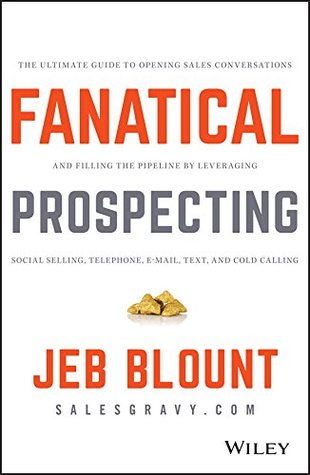More on this book
Community
Kindle Notes & Highlights
by
Jeb Blount
Read between
March 19 - March 28, 2019
When they say, “I'm not interested,” say, “That makes sense. Most people aren't.” Their brain isn't rea...
This highlight has been truncated due to consecutive passage length restrictions.
One phrase you want to avoid is “I understand.” When you use the phrase “I understand,” you sound just like every other schmuck who uses this phrase as insincere filler so they can get back to pitching. It demonstrates zero empathy and tells your prospect that you are not listening and don't care.
Ask
You must ask confidently and assumptively for a specific commitment of time or information, without any hesitation or awkward pause, directly following your turnaround script.
Putting It All Together
Prospect: “We're not interested.” “You know, that is what a lot of my current clients said the first time I called.” (Anchor) “Most people say they aren't interested before they see how much I can save them. I don't know if my service will be a good fit for you and your company, but doesn't it make sense for us to at least get together for a short meeting to find out?” (Disrupt) “How about Friday at 2:00 PM? (Ask)
join the RBO discussion forum at FanaticalProspecting.com
When the Horse Is Dead, Dismount
The real secret to moving on is understanding that anger is just energy and when you harness that energy, you tap into a powerful force. In fact, one of the enduring qualities of highly successful people is the ability to turn disappointment, defeat, and anger into unmovable determination.
17 The Secret Lives of Gatekeepers
Seven Keys for Dealing with Gatekeepers
Be likable.
Use please, please.
use please twice. For example, when a gatekeeper answers the phone you might say, “Hi, this is Jeb Blount from Sales Gravy. Would you please connect me to Mike Brooks, please?”
Be transparent. Tell the gatekeeper who you are—your full name and the name of your company. Full disclosure makes you sound professional and worthy enough to pass through to the boss.
Connect.
Hold the cheese. Never use cheesy schemes or tricks. Tricks don't work.
Ask for help.
Change the game. Sometimes the best strategy is to sidestep the gatekeeper.
Call early or late.
Leverage social.
Meet them in person.
Send an e-mail.
Send a handwritten note.
The Calling-Other-Extensions Hack
The Salespeople-Help-Salespeople Hack
The Go-Around-Back Hack
Persistence Always Wins
18 In-Person Prospecting
In-person prospecting is part of a balanced prospecting approach for outside sales reps. It works best for residential and B2B reps who work in a local territory and sell transactional to semicomplex products and services primarily to small and medium-sized businesses where it is easy to walk in without bumping into a wall of security.
The Five-Step Hub-and-Spoke Technique
The Five-Step Hub-and-Spoke System for IPPs: Plan IPPs around preset appointments. Start with appointments you set during your phone block. Leveraging your CRM, develop a list of prospects close by. A zip code search is often the best means to do this. Plot three to five prospects on a map around your preset appointments. Develop the most efficient driving route to call on these planned IPPs with the least amount of windshield time. Give yourself time between appointments—before or after—to call on these prospects face to face. Don't stop until you reach your goal.
Preparing for Effective In-Person Prospecting
Qualifying:
Making appointments:
Sales conversations:
Building familiarity:
Maximizing your sales day:
Learning your territory:
There are five steps to planning for effective IPPs:
Research.
Personalize your approach.
Develop an objective for every call.
Be prepared to close.
Log calls, notes, and set follow-up tasks in your CRM.
The Five-Step In-Person Prospecting Call Process
Approach with confidence.
Expect to win.
Plan questions in advance.
Identify yourself and say why you are there.


